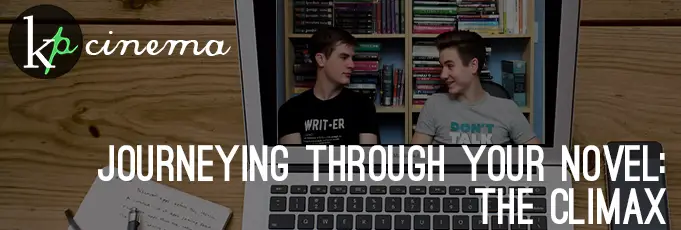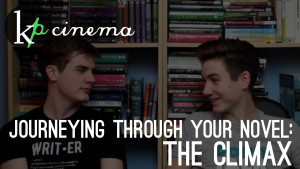In our second-to-last video in this video series, we discuss how Latin words can help us understand the potential pitfalls of a climax, look at why the climax of a novel can be difficult to execute well, and examine the importance of reader expectations to the conclusion of a story. We also talk about Daniel’s ever-morphing hair styles, so stick around after the credits to get the inside story on that!
My article on how to write climaxes: Three Things You Need in Your Climax
Buy our merchandise: KP Swag Shop
Part One: The Characteristic Moment
Part Two: The Inciting Event
Part Three: The Pushpoint
Part Four: Tests and Trials (Part I)
Part Five: The Midpoint Shakeup
Part Six: Tests and Trials (Part II)
Part Seven: The Lowpoint
Music Credit: audiomachine.com



I agree with Daniel— meeting the reader’s expectations does seem hard. 😛 (And don’t think I missed that little Star Wars reference either. Perfect example, actually. 😉 Though in that case I think the case could be made that the villain himself was having problems with strength, so it was more of a ‘who has more of a problem with this’ question than a question of greater strength).
Anyway— question, Josiah. I write fantasy, as I’m sure I’ve said about a million times, 😉 and you mentioned about big epic battles and all that stuff. Fantasy is, after all, renowned for its epicness. But I’m increasingly beginning to find that just ‘epicness’ is not enough— I also like creative. LotR, for instance— the real deciding climax was with Frodo and Sam and Gollum in Mount Doom, not just the battle of the Pellenor Fields. (Please tell me I spelled that correctly 😛 ) Epic battles can happen to anybody over anything at any time and any place— why settle for something so broad and generic, especially when it has become overused? Why not go with something that could only happen with your characters, your plot, and your theme?
So I guess that wasn’t really a question, but what are your thoughts?
Haha, yeah. Daniel and I actually disagree about whether or not Kylo Ren’s loss was realistic (I tend to side with you on that), so that was one of the unplanned diversions in the video!
Good question! I don’t think that fantasy stories need to end in big epic battles, but I think that it’s important when they do not that they don’t disappoint reader expectations. In other words, it works fine if the story never appears to be building toward a big epic battle, or if it appears to be at first, but then ends up with a much more interesting and creative ending. Or if, as is the case of Lord of the Rings, you do have that epic battle, but it’s only a faux-climax. So those kinds of creative endings are really good, and I think really necessary in today’s fantasy stories; the key is to make sure that you aren’t disappointing the reader expectations you’ve already set up in the book by doing so.
XD, absolutely. That’s one of the reasons I like Ren, actually— as a villain, of course. 😉 With Vader, you always knew what you were going to get, whereas Ren’s ‘weakness’ gives him a certain element of the unpredictable, which I like. It keeps me guessing. 😀
Good point. I agree. Sometimes I think it’s very easy to think that fantasy HAS to be epic to be ‘real’ fantasy, just because so many classic fantasies are like that. That was my mindset starting out— but once I realized it, I started brainstorming as to how I could go against that, and I’ll have to say I’m pretty happy with what I’ve been able to come up with. Taking down the stakes, but making the stakes nonetheless just as important.
Not that epic battles as climaxes are bad, of course— but that you shouldn’t do them blindly just ‘because that’s what fantasy is’. Find out WHY you think something, and then why it may or may not be a good idea to follow, and take it from there with whatever works best for your story.
*steps down off soapbox* I’m done preaching now. 😉
Yeah; he was great. Very interesting villain who has a ton of room for future development and character arcs, which makes me really excited to see what they do with him in the future.
I totally agree with you. That’s one of the things that I really like about Brandon Sanderson’s Mistborn series, especially with the later books in the series: really great fantasy that avoids a lot of stereotypical fantasy tropes, particularly in avoiding the large stereotypical battle climaxes that often end fantasy novels.
Yes! That’s exactly what I said about Ren, and everyone looked at me like I was nuts… 😛 Which I suppose isn’t quite so much of a stretch as it sounds. 😉
The climax I’m most proud of, I think, in my work, is a diplomatic climax— a political triumph involving only a few key people and brought about in the very teeth of defeat. I haven’t written it yet, but it’s actually going to be quite a relief not to have to worry about armies and war strategy and stuff and just focus on the character arcs and development that brought the climax about. 😛
Haha, nice. Definitely sounds like a unique way of solving the traditional problems of a fantasy novel! And yeah, not having to figure out realistic battle tactics and such is a huge plus!
Awesome video. 🙂 You guys crack me up! I’m not at the climax yet, but I’ll refer back to this video when I am. 😉
Thanks, Greta! Hope it helps when you end up getting there!